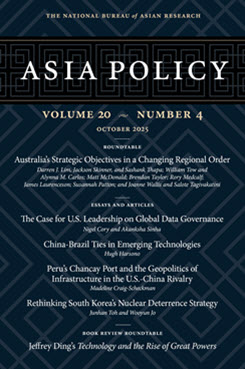Essay in Asia Policy 20.4
Port of Power: Peru’s Chancay Port and the Geopolitics of Infrastructure in the U.S.-China Rivalry
This essay investigates the geopolitical and economic implications of China’s investment in Peru’s Chancay Port in the context of the U.S.-China strategic rivalry in Latin America.
EXECUTIVE SUMMARY
MAIN ARGUMENT
China’s development of Chancay Port in Peru represents a critical juncture in infrastructure diplomacy, exposing three key challenges for the U.S.: (1) growing risks of economic coercion enabled by rapid Chinese investment, (2) the absence of credible development alternatives, and (3) a misalignment in U.S.-Peru policy narratives. The port is emblematic of how China is reshaping global logistics and mineral trade networks. Drawing on ten expert interviews, this policy essay highlights potential pathways for a U.S. response. To respond effectively, the U.S. must adopt a more comprehensive strategy that focuses on strengthening the economic partnership, building institutional capacity, and employing effective communication strategies.
POLICY IMPLICATIONS
- If Chinese investment in ports like Chancay accelerates without matched U.S. engagement, then China will increasingly shape the rules and routes of global logistics and mineral trade in the Western Hemisphere.
- If the U.S. wants to counter China’s growing influence in Latin America, then it must prioritize infrastructure investment and regulatory capacity-building, especially in sectors tied to critical minerals and port governance.
- Framing Chinese investment primarily as a threat undermines U.S. credibility unless it is accompanied by concrete alternatives that address Peru’s economic development needs.
Madeline Craig-Scheckman is a PhD Candidate in Public Policy at Northeastern University (United States). Her research explores the geopolitics of critical minerals and green industrial policy, with a focus on the impacts of U.S.-China competition. As a Chinese Language Fellow with the National Bureau of Asian Research, she is studying Mandarin at National Taiwan University for the 2025–26 academic year. She holds a master’s degree in international affairs from George Washington University and previously worked on renewable energy policy and development in Washington, D.C.
About Asia Policy
Asia Policy is a peer-reviewed scholarly journal presenting policy-relevant academic research on the Asia-Pacific that draws clear and concise conclusions useful to today’s policymakers. Asia Policy is published quarterly in January, April, July, and October and accepts submissions on a rolling basis. Learn more


